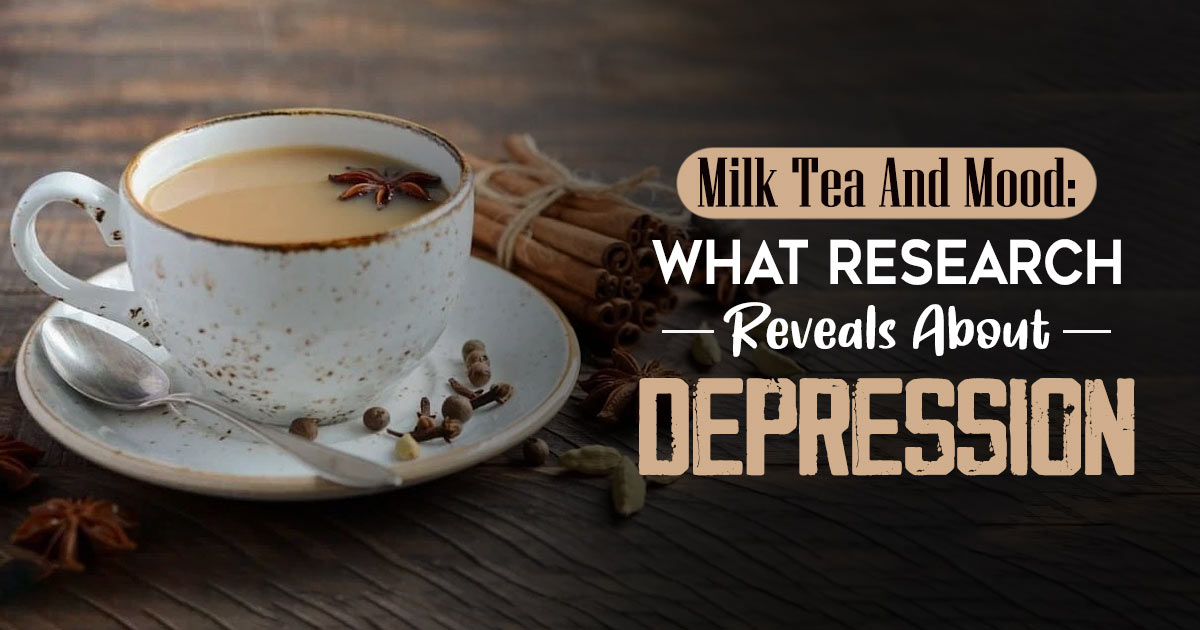In recent years, milk teas, including bubble tea and spiced Indian masala tea, have taken the beverage world by storm, particularly in China and other Asian regions. However, a recent study conducted by scholars from Tsinghua University and the Central University of Finance and Economics in China has raised concerns about the potential connection between milk tea consumption and mental health issues.
The study’s findings suggest that consumption of milk tea causes depression and could significantly contribute to milk tea addiction, anxiety, and even thoughts of suicide.
The Study: Milk Tea Causes Depression
The study in question involved 5,281 college students in Beijing, and its primary objective was to investigate whether symptoms of milk tea addiction were real and if they correlated with conditions like depression and anxiety. The researchers acknowledged the rapid surge in milk tea’s popularity among Chinese youth, setting the stage for their research.
The findings were startling, revealing that some young individuals displayed clear signs of milk tea addiction, with nearly half of the participants admitting to consuming at least one cup of milk tea weekly. One of the key criteria used to assess milk tea addiction was the presence of persistent cravings and excessive consumption, which are characteristics commonly associated with addiction. This study shed light on the alarming prevalence of milk tea addiction among the surveyed college students.
The Loneliness And Depression Connection
Beyond the immediate concerns related to excessive sugar consumption, another significant issue emerged regarding the potential impact of milk teas on mental health. Many milk teas contain caffeine, and this caffeine content raised concerns about its potential to contribute to low moods and social isolation, particularly among adolescents. The study uncovered a concerning connection between milk tea consumption and feelings of loneliness and depression.
While the exact causes of this connection are not definitively determined, it warrants further exploration. The fact that milk tea consumption appeared to be linked to loneliness and depression suggests that there may be underlying psychological mechanisms at play.
Young people in China and elsewhere may be turning to milk tea as a means of coping with emotions and regulating their mental states. In this context, these beverages could become addictive and detrimental to mental health.
Milk Tea As A Coping Mechanism
The researchers speculate that milk tea may serve as a coping mechanism for some individuals, especially in the face of emotional challenges. Coping mechanisms are strategies or behaviors that people use to manage stress, anxiety, or other negative emotions. In the context of this study, it is suggested that milk tea consumption might be a way for young individuals to cope with the pressures and stresses of daily life, including academic and social pressures.
While milk tea may provide temporary relief from stress or anxiety, it is essential to recognize that excessive consumption can lead to addiction symptoms. These symptoms can encompass a range of behaviors, including an increasing frequency of consumption, dependence on milk tea to feel better, intentions to quit but an inability to do so, and feelings of guilt associated with consumption. This consumption of milk tea causes depression when the addiction contributes to a cycle of dependence and potentially exacerbate mental health issues.
Addressing Milk Tea Addiction
The link between milk tea consumption and its potential contribution to depression and other mental health issues raises significant concerns, particularly in regions where milk tea is highly popular among young people. To address this emerging issue and promote mental well-being, several strategies can be considered:
1. Increased Awareness:
Raising awareness about the potential risks associated with excessive milk tea consumption, especially in terms of mental health, is crucial. Public health campaigns and educational programs can help young individuals and their families understand the possible consequences of addiction to sugary and caffeinated beverages.
2. Mental Health Support:
Schools and universities can provide access to mental health resources and counseling services for students who may be struggling with depression or anxiety. Early intervention and support are essential for addressing mental health challenges.
3. Alternative Coping Strategies:
Encouraging young people to explore healthier coping mechanisms for stress and emotional challenges is essential. Promoting activities like exercise, mindfulness, and engaging in hobbies can help individuals manage their emotions without resorting to addictive behaviors.
4. Nutritional Education:
Providing nutritional education can help young people make informed choices about their dietary habits. Understanding the sugar and caffeine content in milk teas can empower individuals to make healthier beverage choices.
5. Regulation And Labeling:
Governments and regulatory bodies can consider implementing regulations on the sugar and caffeine content of milk teas and other beverages. Clear labeling of nutritional information can help consumers make informed choices.
The study suggesting that milk tea causes depression and highlighting the potential role of milk tea addiction in causing mental health problems calls for more awareness, support, and regulation. Although milk teas are popular among young people, we must acknowledge their impact on mental well-being. To safeguard mental health, we should encourage healthier coping methods and offer resources for those facing mental health challenges.






















